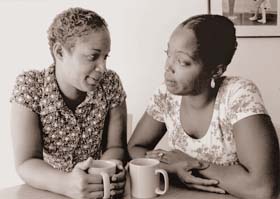
Last week I shared some ideas about what to say to a friend who was in a domestic violence relationship. Here is the link. In that blog, I focused on dealing with a friend who was unwilling to admit that she was suffering from domestic violence.
This week, I share some concrete steps that friends can take to help a victim who is willing to admit her circumstances, and to accept help.
Tip Number 1: Be on standby. If you suspect a friend or family member is suffering from Domestic Violence, offer to be on standby for her text or call if she is afraid. Have your phone on and fully charged at all times and keep it on you.
Tip Number 2: Check in regularly. If you fear for your friend or family member’s life, call or text her once a day at a random time to see if she is all right. If it’s your neighbor, keep an eye on the house and your ears open for any signs or sounds of violence.
Tip Number 3: Be her back-up person. Let her know you will be willing to be a witness or to intervene on her behalf when you are around. Also let her know that she is welcome to take refuge in your home, (at least temporarily, depending on your safety) should she need somewhere to escape to.
Tip Number 4: Provide some relief. If she is being kept at home without relief, do a random act of kindness for her: offer to babysit the children for a few hours while the abuser is out so she can have a breather; send over a baked good with a kind note; offer to pick up groceries for her on your grocery run. If her abuser does not stalk her, allow her to come to your home when you are gone, so she can have a safe, quiet place to rest for a few hours.
Tip Number 5: Help her create a safety plan. Educate her, and yourself, and create a safety plan. See my blog on safety planning. Have the following numbers on standby for your use:
▪ The National Domestic Violence help line (if her country has one).
▪ The local Domestic Violence shelter help line wherever she lives.
▪ The local police wherever she is located.
Bolster her resolve when the time comes to put the plan into action. She will likely be frightened and possibly confused. If you have created her safety plan with her, you can help her remember the steps she wanted to take.
I pray you and your friend will one day be able to sing the song that David sang in 2 Samuel, verses 1 – 4:
David’s Song of Praise
David sang to the Lord the words of this song when the Lord delivered him from the hand of all his enemies and from the hand of Saul.
He said: “The Lord is my rock, my fortress and my deliverer;
my God is my rock, in whom I take refuge,
my shield and the horn of my salvation.
He is my stronghold, my refuge and my savior—
from violent people you save me.




This post has an air of comfort to it. It is good to know that someone has your back, and these steps will provide comfort to an abuse victim and provide good counsel for friends of the victim. The one thing some people may not think of when offering their home as a shelter is the possibility that the violence will spread to their house too. Friends harboring a victim must be ready to call the police at the first sign of the abuser.
I’m reading a book called “Helping Her Get Free: A guide for families and friends of abused women” by Susan Brewster, M.S.S.W. She calls victims’ helpful friends “anchors”. An “anchor” sets boundaries, provides support, etc. and generally behaves in a way that exemplifies mental and emotional health. The victim can look to her anchor for guidance, but the anchor does not ever do anything she’s uncomfortable with doing.
I guess what I’m saying is that abuse spreads. If your friend’s partner is violent, consider that fact carefully before bringing her into your home with your family. Perhaps you could arrange a meeting place and help her get a hotel room instead of baiting the abuser and finding them banging on your door.
Great points Kelly! You are right, the friend should always consider her safety, and that of her family. Oftentimes, the abuser will look for his victim at the home of her friends and family first. That is why I said a friend might allow her to take refuge in your home for a brief time, if you feel it is safe to do so. Once she is there, you could both consider what her next step should be.
If this is not safe at all, the friend could help her consider other options, like hotel rooms, shelters (if they have beds), etc.